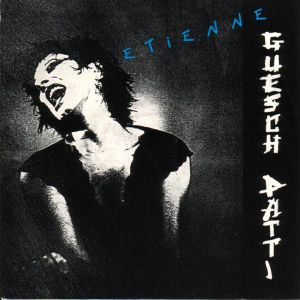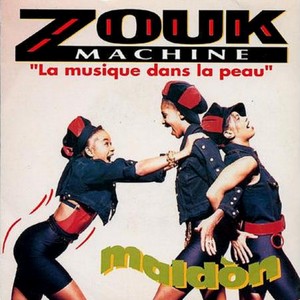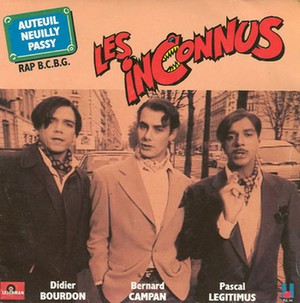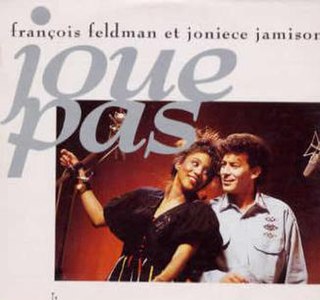Related Research Articles
Niagara was a French rock band that achieved popularity both in France and Canada in the 1980s and early 1990s. The band, who was known under the name L'Ombre jaune from 1982 to 1984, was formed in Rennes, France by vocalist Muriel Laporte and keyboardist Daniel Chenevez. Early on, the band also included guitarist José Tamarin, although he left before the release of their first album.

"White and Black Blues" was the French entry in the Eurovision Song Contest 1990, performed in French by Joëlle Ursull, from her album Black French. The song was performed fourteenth on the night of the competition. At the close of voting, it had received 132 points, tying for second place in a field of 22. "White and Black Blues" was co-written by French pop provocateur Serge Gainsbourg, who had previously composed France Gall's winning entry for Luxembourg in 1965, "Poupée de cire, poupée de son", as well as the Monegasque entry "Boum-Badaboum" for Minouche Barelli in 1967, which had finished fifth.

"Étienne" is a 1987 song recorded by French artist Guesch Patti, from her album, Labyrinthe. It was released as her debut single in late 1987 in several European countries. Particularly famous for its suggestive music video which was censored on certain TV channels, the song was a great success in France, Italy, Switzerland, Austria and Germany where it was a top ten hit.

"Maldòn" is a 1989 song recorded by the Guadeloupean band Zouk Machine. Written and produced by Guy Houllier and Yves Honoré, the song is the first single from the album of the same name, and was released in May 1990. In France, it achieved a huge success, topping the singles charts for nine weeks.

"Auteuil, Neuilly, Passy " is a song recorded by the satiric group Les Inconnus in 1991. Released as a single from their album Bouleversifiant, it achieved great success in France, reaching number one on the national singles chart.

"Words" is a song by English band the Christians. It was the first single from their second album, Colour (1990). Released on 11 December 1989, the song reached number 18 on the UK Singles Chart and became a number-one hit in France, where it topped the SNEP chart for two weeks in May 1990. "Words" additionally became a top-10 hit in Belgium, Ireland, the Netherlands, and Spain.

"Jour de neige" is a 1988 song recorded by French singer Elsa Lunghini. Written by Pierre Grosz with a music composed by Vincent-Marie Bouvot and Georges Lunghini, it was released in November 1988 as the third single from her debut album Elsa. As for the previous three singles, it had a great success in France, reaching number two. Two years later, it was released in Italy and Spain in the languages of these countries.

"Johnny, Johnny" is a 1985 song recorded by the French singer Jeanne Mas. It was her second single from her debut album, Jeanne Mas, on which it features as the second track. Released in February 1985, the song became a hit in France, topping the singles chart for about one month.

"Nuit" is a song recorded by the French trio Jean-Jacques Goldman, Carole Fredericks and Michael Jones. It was the first single from their debut album, Fredericks Goldman Jones, on which the song features as the fifth track. It achieved success in terms of sales in France.

"Mon mec à moi" is a song recorded by the French singer Patricia Kaas. It was the third single from her debut studio album, Mademoiselle chante..., on which it features as the opening track, and her fourth single overall. Released in November 1988, it was Kaas' first top five hit in France, which remains her best peak position on the French Singles Chart.

"Song of Ocarina" is a 1991 song recorded by the musicians Jean-Philippe Audin and Diego Modena. It is entirely instrumental and is played on ocarina by Modena and cello by Audin. Released as the first single from the album Ocarina, it achieved a huge success in France where it topped the chart and remained in the top 100 for almost eight months.

"Nuit de folie" is a 1988 popular song recorded by French pop duet Début de Soirée. It was their debut single from their album Jardins d'enfants and was released in June 1988. In France, it became the summer hit of the year, topping the chart for over two months. It was re-released in 2000 in a remixed version, but it did not reach success.

"High" is a 1988 song recorded by French artist David Hallyday. It was the second of the four singles from his debut studio album True Cool. Released in November 1988, the song was a hit in France, becoming David Hallyday's first number-one single.

"C'est l'amour" is a popular song recorded by Belgian band Léopold Nord & Vous. It was trio's debut single, released in September 1987, from the album of the same name, and perhaps remains to date its most known song, due to the huge success it met in France and the number of cover versions and remixes that it was the subject throughout the years. It can be deemed as band's signature song.

"Le Chat" is a 1992 song recorded by French act Pow woW. Written by the band's four members, this a cappella song was the first single from its debut album Regagner les plaines, and was released in May 1992 with two different single covers for the formats: the first is a photo of the band on a red and black background, and the second is a drawing which shows a cat's tail. "Le Chat" had a great success in France where it was a number-one hit for seven weeks, becoming a popular song throughout the years, and was awarded 'Song of the year' in the 1993 Victoires de la Musique.

"Joue pas" is a 1989 song recorded by French artist François Feldman as a duet with the American singer Joniece Jamison. It was released in July 1989 as the first single from Feldman's album Une Présence, and was his fifth single overall. It achieved great success, becoming a number two hit and a popular song throughout the years.

"Une autre histoire" is a 1987 pop song recorded by French singer Gérard Blanc. It was the first single from his debut album Ailleurs pour un ailleurs and was released in May 1987. It became a smash hit in France in the summer and was covered by several artists throughout the years, thus achieving cult status. It can be deemed as the singer's signature song.

"C'est toi qui m'as fait" is a 1989 song recorded by French singer François Feldman. Written by Jean-Marie Moreau, Thierry Durbet and Feldman, it was the third single from the album Une Présence, released in 1989, on which it appears as the eighth track. It was successful, becoming Feldman's third top two hit. Lyrically, it is a tribute to his mother, referring to her as the person who "built" and "created" him, and his father, who expected for a daughter when his wife was pregnant.

"Déjeuner en paix" is a 1991 pop rock song recorded by Swiss singer Stephan Eicher. Written by Philippe Djian and composed by Eicher, it was released in the middle of 1991 as the lead single from his sixth studio album Engelberg, on which it appears as the fourth track. It became a hit in France and Belgium (Wallonia) and became Eicher's most successful single on the charts.

"C'est écrit" is a 1989 ballad recorded by French singer Francis Cabrel. Written by Cabrel and Roger Secco with a music composed by Michel Françoise, it was the second single from his seventh studio album Sarbacane, on which it appears as the second track, and was released in August 1989. In France, it was a top ten hit and became one of Cabrel's most popular songs.
References
- ↑ Jean-Emmanuel Deluxe (18 November 2013). Yé-Yé Girls of '60s French Pop. Feral House. pp. 480–. ISBN 978-1-936239-72-6.
The band found immediate success with "Tchiki Boom" and then had a string ofhits
- ↑ "Les Années Niagara". RFI Musique . 2002-09-11. Retrieved 2017-11-26.
- ↑ "M&M – New Talent" (PDF). Music & Media . Vol. 3, no. 19. 17 May 1986. p. 15. OCLC 29800226 . Retrieved 11 September 2023– via World Radio History.
- ↑ Habib, Elia (2002). Muz hit.tubes (in French). Alinéa Bis. p. 69. ISBN 2-9518832-0-X.
- 1 2 "Niagara – Tchiki boum" (in French). Les classement single. Retrieved 25 November 2017.
- 1 2 "French single certifications – Niagara – Tchiki boum" (in French). InfoDisc. Retrieved 11 September 2023.Select NIAGARA and click OK.
- 1 2 "Eurochart Hot 100 Singles" (PDF). Eurotipsheet . Vol. 3, no. 15. 19 April 1986. p. 12-13. OCLC 29800226 . Retrieved 11 September 2023– via World Radio History.
- 1 2 "European Airplay Top 50" (PDF). Eurotipsheet . Vol. 3, no. 9. 8 March 1986. p. 10. OCLC 29800226 . Retrieved 11 September 2023– via World Radio History.